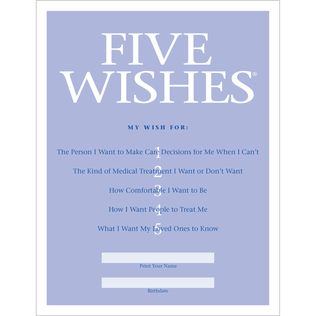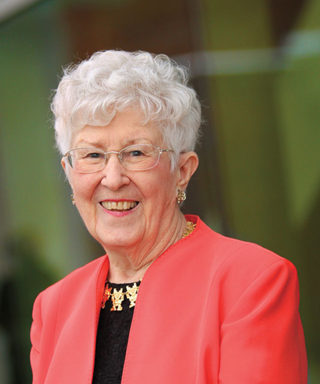
Pediatrics is the branch of medicine that involves the medical care of infants, children, adolescents, and young adults. In the United Kingdom, paediatrics covers many of their youth until the age of 18. The American Academy of Pediatrics recommends people seek pediatric care through the age of 21, but some pediatric subspecialists continue to care for adults up to 25. Worldwide age limits of pediatrics have been trending upward year after year. A medical doctor who specializes in this area is known as a pediatrician, or paediatrician. The word pediatrics and its cognates mean "healer of children," derived from the two Greek words: παῖς and ἰατρός. Pediatricians work in clinics, research centers, universities, general hospitals and children's hospitals, including those who practice pediatric subspecialties.

An advance healthcare directive, also known as living will, personal directive, advance directive, medical directive or advance decision, is a legal document in which a person specifies what actions should be taken for their health if they are no longer able to make decisions for themselves because of illness or incapacity. In the U.S. it has a legal status in itself, whereas in some countries it is legally persuasive without being a legal document.
Palliative care is an interdisciplinary medical caregiving approach aimed at optimizing quality of life and mitigating suffering among people with serious, complex, and often terminal illnesses. Within the published literature, many definitions of palliative care exist. The World Health Organization (WHO) describes palliative care as "an approach that improves the quality of life of patients and their families facing the problems associated with life-threatening illness, through the prevention and relief of suffering by means of early identification and impeccable assessment and treatment of pain and other problems, physical, psychosocial, and spiritual." In the past, palliative care was a disease specific approach, but today the WHO takes a broader approach that suggests that the principles of palliative care should be applied as early as possible to any chronic and ultimately fatal illness.
The American Academy of Pediatrics (AAP) is the largest professional association of pediatricians in the US. It is headquartered in DuPage County, Illinois and maintains an office in Washington, D.C. The AAP has published hundreds of policy statements, ranging from advocacy issues to practice recommendations. Notable positions advocated by the AAP include abortion access for teenagers, a minimum purchasing age of 21 years for tobacco products, background checks, an assault weapons ban, more federal research on gun violence, and favorable statements on circumcision and forms of gender-affirming care.
Gender dysphoria in children (GD), also known as gender incongruence of childhood, is a formal diagnosis for children who experience significant discontent due to a mismatch between their assigned sex and gender identity. The diagnostic label gender identity disorder in children (GIDC) was used by the Diagnostic and Statistical Manual of Mental Disorders (DSM) until it was renamed gender dysphoria in children in 2013 with the release of the DSM-5. The diagnosis was renamed to remove the stigma associated with the term disorder.
Adolescent medicine also known as adolescent and young adult medicine is a medical subspecialty that focuses on care of patients who are in the adolescent period of development. This period begins at puberty and lasts until growth has stopped, at which time adulthood begins. Typically, patients in this age range will be in the last years of middle school up until college graduation. In developed nations, the psychosocial period of adolescence is extended both by an earlier start, as the onset of puberty begins earlier, and a later end, as patients require more years of education or training before they reach economic independence from their parents.
In the field of medicine, a healthcare proxy is a document with which a patient appoints an agent to legally make healthcare decisions on behalf of the patient, when the patient is incapable of making and executing the healthcare decisions stipulated in the proxy. Once the healthcare proxy is effective, the agent continues making healthcare decisions as long as the primary individual is legally competent to decide. Moreover, in legal-administrative functions, the healthcare proxy is a legal instrument akin to a "springing" healthcare power of attorney. The proxy must declare the healthcare agent who will gain durable power attorney. This document also notifies of the authority given from the principal to the agent and states the limitations of this authority.

Five Wishes is a United States advance directive created by the non-profit organization Aging with Dignity. It has been described as the "living will with a heart and soul".
Community Hospice & Palliative Care, also known simply as Community Hospice, is a not-for-profit hospice, which has served the Greater Jacksonville Metropolitan Area since its inception in 1979. The organization was the first hospice program in Northeast Florida and one of a few operating programs in the state when Florida began granting hospice licenses in 1981; Community Hospice received their license in 1983 and in 2008, assisted nearly 1,000 patients daily and more than 6,000 patients a year.

A pediatric intensive care unit, usually abbreviated to PICU, is an area within a hospital specializing in the care of critically ill infants, children, teenagers, and young adults aged 0-21. A PICU is typically directed by one or more pediatric intensivists or PICU consultants and staffed by doctors, nurses, and respiratory therapists who are specially trained and experienced in pediatric intensive care. The unit may also have nurse practitioners, physician assistants, physiotherapists, social workers, child life specialists, and clerks on staff, although this varies widely depending on geographic location. The ratio of professionals to patients is generally higher than in other areas of the hospital, reflecting the acuity of PICU patients and the risk of life-threatening complications. Complex technology and equipment is often in use, particularly mechanical ventilators and patient monitoring systems. Consequently, PICUs have a larger operating budget than many other departments within the hospital.
The Emergency Medical Services for Children (EMSC) program is a US federal government health initiative. It is administered by the U.S. Department of Health and Human Services’ Health Resources and Services Administration (HRSA), and the Maternal and Child Health Bureau (MCHB). Its aim is to reduce child and youth disability and death due to severe illness or injury by increasing awareness among health professionals, provider and planners and the general public of the special needs of children receiving emergency medical care.
A surrogate decision maker, also known as a health care proxy or as agents, is an advocate for incompetent patients. If a patient is unable to make decisions for themselves about personal care, some agent must make decisions for them. If there is a durable power of attorney for health care, the agent appointed by that document is authorized to make health care decisions within the scope of authority granted by the document. If people have court-appointed guardians with authority to make health care decisions, the guardian is the authorized surrogate.

Nicklaus Children's Hospital formerly known as Miami Children's Hospital is a hospital for children in South Florida. The hospital has 289 beds. It is affiliated with the FIU Herbert Wertheim College of Medicine, Nova Southeastern University, and St. George's University and is a member of Nicklaus Children's Health System. The hospital provides comprehensive pediatric specialties and subspecialties to pediatric patients aged 0–21 throughout South Florida. Nicklaus Children's Hospital features the only Level 1 pediatric trauma center in the region, and 1 of 3 in the state. It has 650 attending physicians and over 130 pediatric sub-specialists. Nicklaus Children's Hospital was one of the largest employers in Miami-Dade County in 2014 with over 3,500 employees.

Loretta C. Ford is an American nurse and the co-founder of the first nurse practitioner program. Along with pediatrician Henry Silver, Ford started the pediatric nurse practitioner program at the University of Colorado in 1965. In 1972, Ford joined the University of Rochester as founding dean of the nursing school.
Advance care planning is a process that enables individuals to make plans about their future health care. Advance care plans provide direction to healthcare professionals when a person is not in a position to make and/or communicate their own healthcare choices. Advance care planning is applicable to adults at all stages of life. Participation in advance care planning has been shown to reduce stress and anxiety for patients and their families, and lead to improvements in end of life care. Older adults are more directly concerned as they may experience a situation where advance care planning can be useful. However, a minority use them. A research conducted in Switzerland with people aged 71 to 80 showed that better knowledge on advance care planning dispositions could improve the perception older people have of them. Communication on dispositions should take into account individual knowledge levels and address commonly enunciated barriers that seem to diminish with increased knowledge.
A pediatric nurse practitioner (PNP) is a nurse practitioner who specializes in care for newborns, infants, toddlers, pre-schoolers, school-aged children, adolescents, and young adults. Nurse practitioners have an in-depth knowledge and experience in pediatric healthcare including well childcare, and prevention/management of common pediatric acute illnesses and chronic conditions. This care is provided to support optimal health of children within the context of their family, community, and environmental setting. In order to be a pediatric nurse practitioner one must be compassionate, resourceful, good at communicating and have good attention to detail. In the past couple decades, the job of a nurse practitioner has nearly doubled in the United States. Pediatric nurse practitioner numbers have stayed relatively the same. It is expected that the demand for the PNPs will start to increase in our society. This demand comes from children with chronic illnesses which are surviving and having diseases. PNPs are mostly taking over offices over the physicians, but still work side by side.
Cook Children's Medical Center is a not-for-profit pediatric hospital located in Fort Worth, Texas. One of the largest freestanding pediatric medical centers in the U.S., Cook Children's main campus is located in Tarrant County. The hospital provides comprehensive pediatric specialties and subspecialties to infants, children, teens, and young adults aged 0–21 throughout the Dallas-Fort Worth metro and the greater region. Cook Children's also has an ACS verified level II pediatric trauma center. The hospital has a rooftop helipad for the critical transport of pediatric patients to and from the hospital.

Harry James Towey II is an American former government official and academic administrator. Towey was appointed secretary of the Florida Department of Health and Rehabilitative Services by Governor Lawton Chiles in 1993, and ousted by the Florida Senate in 1995. He founded Aging with Dignity, a nonprofit advocacy organization for senior citizens, in 1996 and coauthored the end-of-life planning document Five Wishes. He was Director of the White House Office of Faith-Based and Community Initiatives (OFBCI) from February 2002 to May 2006. Towey was President of Saint Vincent College from 2006 to 2010 and President and CEO of Ave Maria University from 2011 to 2019.

Nadia Lauren Dowshen is an American pediatrician and adolescent medicine physician. She specializes in the care of youth living with HIV infection and medical care to transgender and gender-diverse youth. Dowshen researches health inequality, access to care, and promoting resilience in LGBT youth. As an associate professor at the Perelman School of Medicine at the University of Pennsylvania, she is also the medical director and co-founder of the Gender and Sexuality Development Clinic.
Prasanna Nair is an Indian-born doctor working in the United States. She works in primary health care with a specialty in pediatric endocrinology








